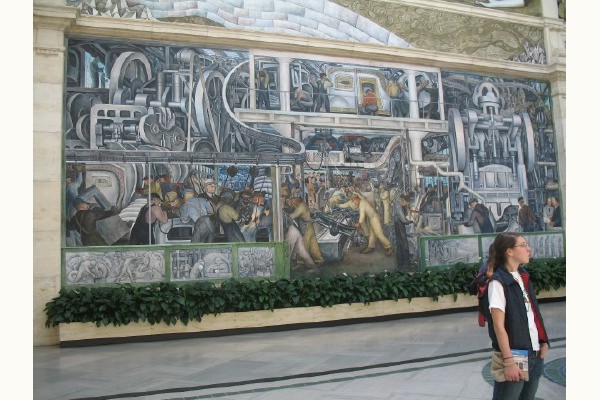Detroit and Ann Arbor
Detroit Institute of Arts
Visit to the site of ma conference, the Detroit Institute of Arts. Interesting collection of Islamic Arts under the supervision of the curator, Dr. Heather Ecker. Another interesting collection is that of African Arts. But I turned my attention to this huge and famous fresco, showing different activities of MoTown, the car city…
Wednesday, March 16, 2011
The University of Ann Arbor, where I am invited to give a talk as a guest lecturer, in an Undergraduate Seminar, “Evidence of International medieval trade, Mediterranean/Indian Ocean: Archaeological finds at Quseir”
Abstract
Quseir was a trading town in Egypt on the Red Sea coast. Archaeological finds indicate intense trading activity during the late Ayyubid period (1200-1240). Among these finds are documents, mainly written on paper or inscribed textiles, that show that Quseir participated in the great trade that joined the Mediterranean region to India, through Fustat (Old Cairo) and the Yemen. This seminar will focus on these documents, shedding light on the methodology used by a papyrologist who is the first to date and classify documents. As the documents are archaeological finds, papyrologists can use a range of clues to date them, which are not available when dealing with archival contexts.
Friday, March 18, 2011
I speak in the Lecture Hall of the Detroit Institute of Arts, sponsored by Asian & Islamic Art Forum
“Jinns, images of jinns, and magical medicine in contemporary Yemen”
Abstract
Magical medicine is used in some traditional parts of the Islamic world to confront three principal causes of diseases: the evil eye, sorcery, and jinns (genies). Different types of objects provide evidence for various kinds of magical therapy, but very few survive that appear to be used to treat the effects of sorcery. Images of jinns are also highly unusual. However, in a manuscript found in Yemen, representations of kings of various tribes of the jinn are more than mere illustrations. They represent part of magical texts that are used for the purpose of chasing away jinns in cases where individuals are thought to be possessed by them.
Yemeni-American Net
Detroit Institute of Arts
Gr8LakesCamper
- Uncategorized
- Comments Off on Detroit and Ann Arbor


